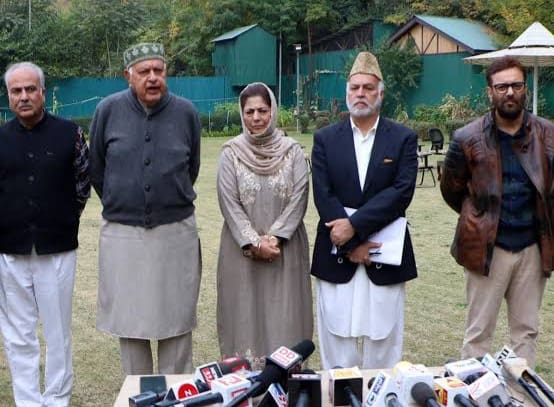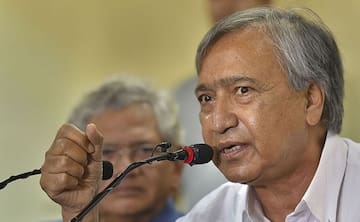
Mubashir Naik and Zoya Malik
As Jammu & Kashmir encounters the parliamentary election this month, uncertainty looms, about whether the Kashmiri people will cast their vote or stay away from the voting process as they used to do in the past.
So far, the polling had taken place only in – Jammu-Reasi- one of the five constituencies of the newly carved-out union territory.
Despite political leaders anticipating a significant turnout in Kashmir, the ground reality looks quite grim. Every political party is trying to convince people to vote for their candidate but no party can put forward a strong election manifesto that can attract the voters. Public gatherings at political events have been very low, indicating a lack of interest among the people in the election process.
In the current political situation, it’s evident that there’s growing discontent among the public. A viral video clip circulating on social media sums up the sentiments of many who feel disappointed with the present state of affairs.
In the video, a young man is seen saying:
“Our flesh has been peeled off, now only bones are left – they are coming after our bones now.”
Lack of appealing manifestos and disintegration of regional parties
After 2019, this is the first major election to be held in Jammu & Kashmir. Before 2019, Article 370 and Article 35 used to be the main election manifesto of all the regional parties but now that both Article 370 and 35 stand abrogated, no regional party has produced a substantial manifesto that can catch the attention of voters.
On 19th April, People’s Democratic Party (PDP), one of the strongest regional parties, released its election manifesto but that was also limited to developing roads and connectivity, empowering women, providing drinking water and Education, and other basic necessities.
Another major regional Party, National Conference (NC) is yet to put forward its manifesto.
While talking with Maktoob, Noor Ahmad Baba, a Kashmiri Political Analyst said, “To me there can be different reasons behind public disinterest; maybe people have not been fully mobilized and they may be unhappy about how the events have turned out because of the disunity amongst regional parties. Both the major regional parties have failed to put forward any striking issues. Political unity has gone missing. In this election, people would have accepted the united front in Kashmir. The People’s Alliance For Gupkar Declaration (PAGD) , which emerged as the strongest unified group after 2019, has already gone into shambles. Even the political campaigning has not been in full swing so far.”
Abrogation of Article 370 and distrust among the public
The Modi-led BJP government, abrogated Article 370 and divided J&K into two union territories on 5th Aug 2019 without taking regional leadership into confidence. All the major regional leaders were detained, a curfew was imposed and mobile connectivity was taken down before the Indian parliament made a formal announcement on 5th Aug.
Baba believes that the abrogation of Article 370 has created a wide distrust among the public in the electoral process but also asserted that there is no way out now. Ideally, people would want to have a democratically elected representative who can take up their demands in Parliament. However the ongoing wrangling situation of PAGD has disappointed many people as they would have wanted a greater unity among like-minded parties to fight for, at least, the restoration of the pre-2019 position of J&K.
The People’s Alliance for Gupkar Declaration (PAGD), emerged as a strong unified political group in Kashmir post-2019, but it broke down just ahead of the election due to differences in seat sharing.
At the time of the formation of the alliance, all the signatories had asserted that they would strive for the restoration of statehood, Article 370 and Article 35. But with its fall, all hopes vanished.
The spokesperson of PAGD, Mohammed Yousuf Tarigami, on the other hand, refused any disunity among the members of the alliance. Tarigami told Maktoob that it was not born out of electoral consideration, rather it emerged for the advocacy of constitutional rights that the union government snatched.


“As far as the present situation is concerned, we all are part of the INDIA alliance. Even if there are differences, the real question here is whether people can differentiate between constituents. The major concern is to face the challenge of BJP unitedly and to do our best to not allow their candidates to succeed in any way and any form”, said Tarigami.
Just ahead of the elections, both the National Conference (NC) and People’s Democratic Party (PDP) have announced their party candidates from all three seats of the valley. This has led to chaos among the public, what is next?
Enforced silence and suppressed ferment
According to Tarigami, since 5th August 2019, virtually the rights of people have been assaulted- unilaterally by the union government. Common people feel disgusted. Even the media feels choked. It is a huge assault on people cutting across the line of different political views, and they feel deeply demoralized.
Moreover, following the abrogation of Article 370, almost all the factions of Hurriyat conference, which used to give election boycott calls during every election, have been banned. Most of the leaders have been shifted to outside jails, aiming to suppress anti-Indian sentiment in the region. The Hurriyat calls had a major role in the election and most people used to stay away from the
election.
Leh and Kargil were earlier seen divided on different issues but now, they are standing together. They feel their rights of survival, job and land are at stake. That’s why they have demanded a 6th schedule.
Even in the Jammu region, BJP’s stronghold, a large section of people feel disappointed with the performance of their representatives in the parliament.
“Earlier the dissatisfaction was limited to Kashmiris & Ladakhis but now Jammu has also joined. This is because of the downgrading of a state. There are less expectations from the rhetoric procured by the current government in Delhi,” Tarigami said.
“Media, businessmen, employees – the common man don’t feel free to express themselves. Employees are barred from using WhatsApp (even to talk about day-to-day life) and many similar restrictions are imposed on common people. living under such an atmosphere we cannot say we live in a democracy nor it can be said there is democracy. There is no democracy at all, that is why people are concerned about the survival of democracy now,” he added.
Mubashir Naik and Zoya Malik are independent Journalists based in Kashmir. Their work has been published in many international publications including The New Arab, The Quint, The Wire, Two circles.net, Women Media Center, Fair Planet, Article 14, News Click, and others.



